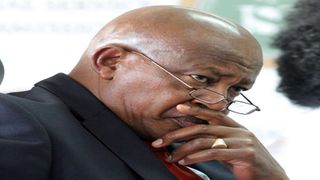
Attorney General Kihara Kariuki.
| Dennis Onsongo | Nation Media GroupPolitics
Premium
BBI at Supreme Court: 11 key questions AG Kariuki wants answered
Attorney-General Paul Kihara Kariuki has formally filed his appeal at the Supreme Court in his final push for constitutional amendments through the Building Bridges Initiative (BBI).
The AG has petitioned the apex court to determine 11 questions that are likely to revive the government-backed BBI process.
Basic Structure
Three of the questions that he wants the court to determine are related to the Basic Structure doctrine. First, Mr Kariuki wants the Supreme Court to determine whether the Basic Structure is applicable in Kenya.
Second, the AG wants the court to determine whether the doctrine limit the amendment power set out in Articles 255 and 257 of the Constitution.
Thirdly, the Supreme Court will address the question of whether the Basic Structure of the Constitution is amendable only through a model described by the Court of Appeal and the High Court as primary constituent power.
He is aggrieved by the finding of the two courts which stated that the Constitution has a basic structure that can only be altered through a model described as primary constituent power. The model, according to the two superior courts, includes four sequential steps listed as civic education, public participation and collection of views, constituent assembly debate and ultimately a referendum.
AG Kariuki wants to answer the question: “is the basic structure of the Constitution amendable only through the Primary Constituent Power which must include the four sequential processes?”
Question of the President
Fourthly, AG Kariuki wants the court to decide whether the President is precluded from initiating changes to the Constitution by way of Popular Initiative. In the disputed judgment, the Court of Appeal judges ruled that the Popular Initiative route is not available for use by the President.
Instead, the judges said, he should use a Parliamentary Initiative by proposing changes of the Constitution to the legislature through the Attorney General.
In the fifth and sixth questions, the Attorney General wants the Apex Court to inform him whether the President is precluded from promoting and supporting a Popular Initiative to amend the Constitution.
The seventh proposed question is: ‘Can a State Organ, State officer or public officer initiate constitutional amendments through a Popular Initiative?”
Was BBI illegal?
Eighth, is the question relating to the proposal for creation of 70 new parliamentary constituencies and their apportionment to in 28 select counties. The AG wants the Supreme Court to determine whether the Second Schedule of the Constitution of Kenya (Amendment) Bill 2020, the BBI Bill, was unconstitutional.
In his ninth proposed question, the AG is seeking a determination on “can the President be sued in civil proceedings in his personal capacity under Article 143 of the Constitution during his or her tenure of office’.
The tenth question is whether the BBI Bill complied with the constitutional requirement of public participation.
And lastly, he wants a determination on who should bear the costs of the legal dispute at both the Court of Appeal and the High Court.
In the 33-page appeal drawn by Solicitor General Kennedy Ogeto, the AG has faulted the Court of Appeal for disregarding the text of the Constitution on amendment provisions. He claims that the appellate judges misconstrued the historical context of Chapter 16 of the Constitution, imposed a definition of “amendment” that contradicts its constitutional context and misapplied judicial decisions on the Basic Structure doctrine.
“Their decision on Basic Structure is inconsistent with a line of (past) decisions by the High Court and Court of Appeal which affirmed that all provisions of the Constitution were amendable by reference to Chapter 16,” says Mr Ogeto.
He cites Chapter 16 which says “all provisions of the Constitution are amendable”.
Battle lines drawn
The battle at the Supreme Court promises to be a tough one, with Nairobi-based lawyer Charles Kanjama filing an appeal at the Supreme Court seeking endorsement that the basic structure doctrine is applicable in Kenya.
In addition, Mr Kanjama wants the Supreme Court to hold that the steering committee on implementation of the Building Bridges Initiative (BBI) to a united Kenya taskforce report (BBI Steering Committee) has no legal capacity to initiate any action towards promoting constitutional changes.
He is also seeking an affirmation that the BBI Bill is unconstitutional and an usurpation of the people’s exercise of sovereign power.
Another appeal filed by lawyer Morara Omoke is seeking determination on whether a Bill to amend the Constitution should concern one or multiple issues.
Mr Omoke wants the Supreme Court to determine whether Article 257(10) requires an amendment to the Constitution, be presented to the voters in form of separate and distinct referendum questions, or multiple amendments may be contained in a single referendum ballot paper.
He also wants the Supreme Court to set aside a finding of the court of appeal that a proposed referendum on multiple amendments of the Constitution, like the BBI Bill which proposed 74 amendments of unrelated laws, can be submitted as a single question to the voters.





